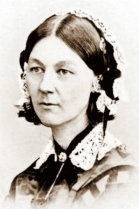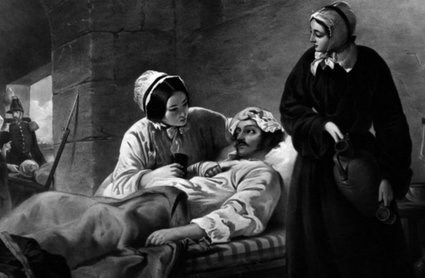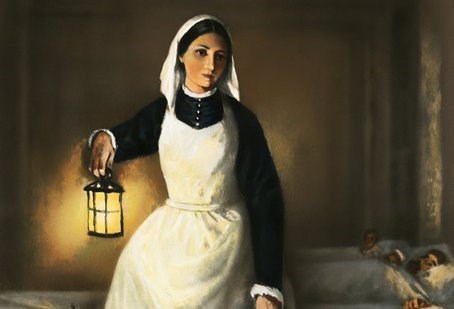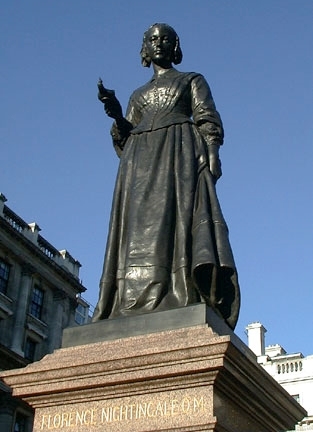 |
| Florence Nightingale. (www.ajnoffthecharts.com (AJN)) |
 |
| Nightingale nursing wounded soldiers from battle. (www.e-infopages.com (Chan Lee Peng)) |
Florence Nightingale showed great
humility throughout her life. During her lifetime, she performed many great
things, which had made her famous throughout her time and beyond. Ultimately,
she could be rich, powerful, and high in class due to her success, but she
refused: "In November 1855 a Nightingale fund had been set up to found a
training school for nurses. This was the only recognition of her services which
Nightingale would approve of" (Bloy). Although Nightingale benefited the
lives of many and even revolutionized nursing which influenced the world, she
accepted little gratitude for her works. She had the perfect opportunity to
have a favorable and wealthy life, but she declined this generous offer because
she was humble. A true hero would never possess great pride for his/her actions,
but would show humility, which is what Nightingale had. She also had reasons
for declining the offer of a good life: "Although Nightingale was a respected
and well-known woman in her time, she did not want to die as one. She didn't
think of herself as a famous nurse who changed the history of the world, so she
decided to remain hidden from the world and pass away with her family
instead" (Jenkins). It is obvious to see that the acts of Nightingale made
a difference to the world. The ironic thing is that the person herself,
Florence Nightingale, never understood that she was a legend. In fact, she saw
that she was only a nurse and decided to be like everybody else, not a
historical figure that saved the lives of many. She had humility as a trait, so
she desired no acknowledgement from anybody. This shows that Nightingale did
not care about fame and fortune, but about the benefit of others.
Perseverance is another trait Nightingale
possessed, which makes her a hero. Nightingale's success also came with a
price. She struggled through several impediments that kept her from achieving
her goal, such as after "Returning from the Crimea, Nightingale
experienced recurring bouts of a disabling illness, often preventing her from
walking. Nightingale continued, however, as an advocate for health
reforms" (Jenkins). As it says, Nightingale experienced illness which restrained
her from performing actively demanding activities, including nursing to other
people in different places, but Nightingale's goal was to help other people.
She was smart and found a "loophole" in the rules of her sickness,
which lead to many other ways she could help others. Nightingale's perseverance
is what allowed her to continue to do the things she wanted to do, regardless
of the circumstances. Nightingale's health wasn't the only roadblock to
stopping her to achieve her goal: "For most of her ninety years,
Nightingale pushed for reform of the British military health-care system and
with that the profession of nursing started to gain the respect it
deserved" (Riddle). Nightingale continued to surpass anything that the
prevented her from reaching her dream, including the British military. She
wouldn't concede, and was persistent until she finally got what she desired. In
the end, her persistence and determination allowed her to succeed. This shows
that Florence Nightingale did everything she could to nurse and care of others
who needed help. She sacrificed everything she had, including her time and even
her life, for the benefit of others. Also, she did whatever she could to get
the job done.
 |
Throughout her life, Nightingale showed kindness towards others during her services as a nurse and throughout the rest of her life. She was an accepted person, and a revolutionizing person in the making. But, why was she considered this? It was not only her nursing skills that shifted her to the next level, but also her kindness to others: "By now she was idolized by the troops and the public as the 'Lady with the Lamp' and the 'Nightingale in the East.' But this popular image is essentially false. Although she did active nursing in the wards, her real work lay outside the expression of tenderness and compassion" (Gale Biography in Context). Nightingale's good character helped her nursing. She was known for her feats in nursing and her nice personality, for example, her kindness. One of the reasons why everybody liked Nightingale was because she was kind to others. Kindness is a great trait to show to help other people both physically and emotionally. Her kindness to others guided her throughout her whole life to reach her goal of helping other people: "Nightingale knew what was the best for the nurses and patients she helped, and desired to do whatever she could to help them get it" (Jenkins). For Nightingale, kindness and compassion was the key to her success. She knew what she needed to help other people, and she sacrificed everything for it. Nightingale devoted the rest of her life to nursing people. Someone who is kind wouldn't even think about doing such an act. As a result, Nightingale became influential and well-known through her kindness, not only healing others, but giving them hope as well. This shows that Florence nightingale committed herself to improve the lives of other people. Fortunately, she succeeded. Her acts of kindness, such as nursing soldiers during the Crimean War, helped other people and paid off.
 |
| In memory of Florence Nightingale (www.victorianweb.org (Arthur George Walker)) |
Florence Nightingale was considered a great nurse and hero because of her works and her strong character, showing humility, perseverance, and kindness to people around her. Â A true hero must demonstrate good character, such as being trustworthy, respectful, responsible, fair, caring, and good citizenship. Florence Nightingale is an inspiration because of her strong and well-developed character. Nightingale devoted her whole life to other people rather than herself. Not only did she tell people she wanted to help others but she truly stuck with her profession and did everything she could to make the lives of people a lot better, despite the circumstances. She also made people happy thought her kind personality, being there for them and suiting their needs. She was even widely known and named as "The Lady with the Lamp" and "Nightingale in the East" because she took such great care of patients in each hospital she volunteered at. Her works later on became the basis of modern day nursing. "As early as 1867, [Nightingale] wrote, 'My view is that the ultimate destination of all nursing is the nursing of the sick in their own homes.but it is no use to talk about the year 2000.' And look at what's been happening over the past two decades, with health care reform shifting from acute impatient care to outpatient and home care'" (Klakovich). Nightingale was a strong fighter, committed solely on benefiting others. Nightingale pursued her dream, passing every obstacle in her way. That is why she is an inspiration. Â Character is the key to an exceptional hero. Superman, Batman, George Washington, and Florence Nightingale all are different, yet similar at the same time. It's not about the laser eyes, or the becoming the first president of the United States. Their character, containing trustworthiness, respect, responsibility, fairness, caring, and citizenship, is what makes them heroes. Each hero needs to possess the key essential of not knowledge or power, but character. That is what makes the title "hero" true.
Audain, Cynthia. "Florence Nightingale." Biographies of Women Mathematicians. N.p., 2 July
2012. Web. 10 Dec. 2012.
Bloy, Marjie. "Florence Nightingale (1820 -1910)." The Victorian Web. N.p., 3 Jan. 2012. Web.
10 Dec. 2012.
"Florence Nightingale." Encyclopedia of World Biography. Detroit: Gale, 1998. Gale Biography
In Context. Web. 10 Dec. 2012.
Jenkins, Ruth Y. "Nightingale, Florence." Europe 1789-1914: Encyclopedia of the Age of
Industry and Empire. Ed. John Merriman and Jay Winter. Vol. 3. Detroit: Charles
Scribner's Sons, 2006. 1636-1638. Gale Virtual Reference Library. Web. 10 Dec. 2012.
Klakovich, Marilyn. "Florence Nightingale: A Nursing Leader Ahead of Her Time." University
of Phoenix. N.p., 5 May 2009. Web. 10 Dec. 2012. <http://www.phoenix.edu/profiles/
faculty/marilyn-klakovich/articles/florence-nightingale-a-nursing-leader-ahead-of-her-time.
html>.
Page created on 1/10/2013 12:00:00 AM
Last edited 1/10/2013 12:00:00 AM
